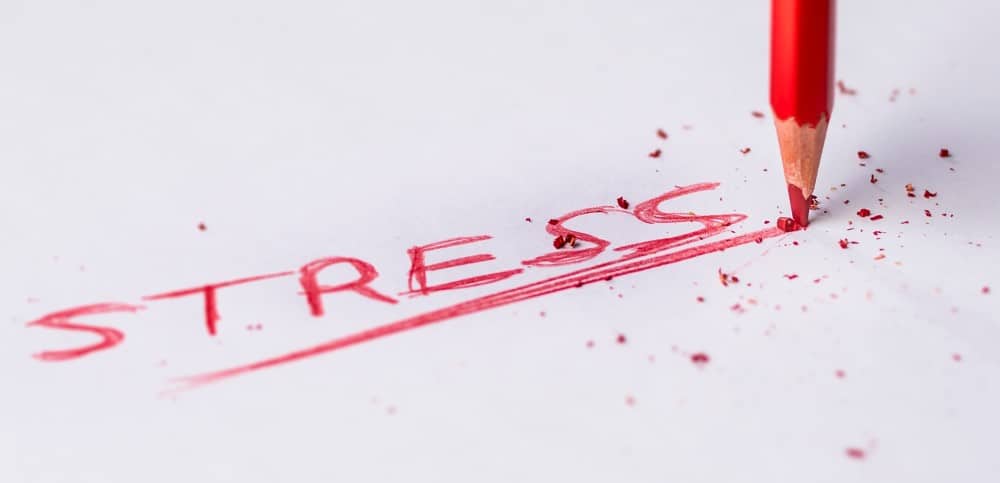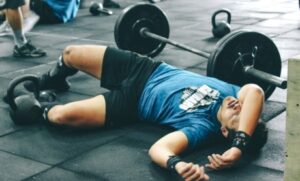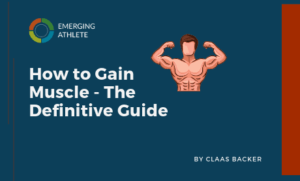One of the biggest problems in the discussion about training is that, for the most part, we are talking only about physical stressors.
We love complex periodization models, we manipulate training volume, intensity, and frequency. In short, we like it when we are in control.
Sure, diet and sleep also play their part, but as long as you take care of these factors, which are often summarized under “recovery” or “regeneration”, you are good to go, right?
The questions is, is there a connection between Stress and Muscle Loss?
However, these factors do not represent the overall picture. Biology is very confused and your body is not just a simple machine that you feed with your inputs just to get predictable outputs afterward.
Okay, you may have a rough idea of where the whole thing is going, but adding 1 and 1 does not necessarily mean 2. Maybe it will be a 2 in most cases, but sometimes it will be a 5 or so a -3. But why is that so?

Physiological Stress
Well, your body is not in a static state that just needs to respond to the workouts you are putting on it. At any given moment, billions of different reactions take place in your body and they decide what happens at a systemic level, while simultaneously dozens of inputs through your thoughts and senses find their way into the system.
1 + 1 is not always 2 because your body is never dealing with 1 + 1. It has a lot more to do with 1 + 1 plus a million other inputs and determinants. The result may well be between 1.5 and 2.5 in most cases, but there is still enough room for ambiguity that makes prediction difficult, difficult to account for, and probably impossible to quantify.
Biology is non-linear. You can not control them, but – in the best case – just influence.
With Trial & Error, you can get a very good idea of how your body will respond to certain training parameters. However, the response is still context-specific and largely influenced by how well your body can respond to stress. If you have a comfortable schedule with a 9 to 5 job, your social life is predictable, your sleep and diet are not disturbed, then you can very well gauge how your body will respond to exercise stress. The more constant the other inputs, the more predictable the result will be if you apply certain stressors (in this case, training).
However, as you increase the overall stress your body struggles with, it decreases its ability to acclimate to given workout stress.
Even if your training inputs have not changed, the rest of the inputs fed to your system will have changed, causing the system to react differently, possibly unpredictable.
Basically, the General Adjustment Syndrome states that your body incorporates the stress it causes into a large pool of “adaptive reserves,” which it can then use to make specific (necessary) adaptations to it the stressors respond. Thus, the body is strengthened in case the same stressor acts on it again in the future.
Applied to weightlifting, structural and metabolic capacities of the musculature represent the stress and your body responds by augmenting those capacities by building muscle. Bigger, stronger muscles give him the ability to defend himself better against stress. In addition, more enzymes are being produced to cope with stress metabolically. However, when other stressors (eg, work stress, low sleep, binge drinking, relationship problems, moving stress) are also involved, these adaptive reserves are tapped to a greater extent so that your body can no longer adequately respond (adapt) to exercise stress.

Study on Stress on Muscle Loss
Scientists have sent questionnaires to 1,200 people to locate on the PPS (Perceived Stress) scale. Based on their PPS score, the team contacted those individuals who achieved a high or low score to ensure that there was a significant difference in stress levels between participants.
First of all, perhaps it should be mentioned that there were no significant differences in the parameters (MIF, 1 RM of physical strength, jump height, power in the bicycle ergometer) between the groups at the beginning of the study. Similar scores were achieved for the total workload and cardiovascular response to training (maximum and average heart rate) between the high stress and low-stress groups – which is about as much as not simply saying that a group is a better one when the other group scored because they trained harder.
The rate of regeneration as a result of the training was strongly correlated with the stress parameters.
After the test for the maximum isometric strength, all participants were absolutely dead, so that the physical strength had fallen by up to 50% immediately after training. After the 60-minute window, however, the subjects were able to recover well. From then on things got better and better.
While the Low-Stress group felt fully recovered after 48 hours, the High-Stress group needed 96 hours to reach the initial pre-workout MIF.
The scientists identified this pattern by comparing the two groups. To ensure that there were no disruptive factors, adjustments were made for fitness, training experience, and workload. It showed an identical picture.
Effects of Stress on Muscle Loss
Your training results cannot be reduced to how many sets, reps, and exercises you completed. Other factors affect how your body responds to exercise.
In addition, you can not just take your current performance in the gym to decide how hard you should train. Other stressors are also important. To return to the study results: Both groups have completed an identical weight with identical volumes. They had similar strength values in the wheel ergometer test and at the vertical jump height.
This is a factor that makes it difficult to manage overtraining/overreaching. We all love to look for objective signals – less repetition, less weight on the pole, etc. The present study provides an indication that other stressors play into training regeneration before the performance suffers.
Recovery problems after a single session may not seem like a big deal, but it accumulates over time when you are constantly struggling with chronic stress. Incidentally, this is the same group of scientists who found out in a 12-week training experiment that individuals with a high-stress level build less force in squats and bench presses than people with low-stress levels.
As previously mentioned, stressed individuals had stressful life events and felt stressed out by them. Of course, you can not deduce from this how someone reacts who has a lot of stress in life but still manages to feel relaxed. Just as you can not deduce how someone reacts, who has little stress in life, but who brings every little bit out of balance.
Conclusion: Stress and Muscle Loss
While athletes mostly look at parameters such as sets, reps, and intensity, studies show that other stressors can have a significant impact on an athlete’s performance.
Stress does not only affect health, but it can also lead to worse recovery from workouts and in the worst case to muscle loss.
My recommendation, take life easy and have a great time. This will not only make you happier but also benefit all other areas in life. Because stress will always have a negative impact.




